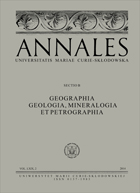Xenophobia and Locals’ Negative Attitude Toward Tourists at the End of a Global Health Crisis:
The Case of the COVID-19 Pandemic
Xenophobia and Locals’ Negative Attitude Toward Tourists at the End of a Global Health Crisis:
The Case of the COVID-19 Pandemic
Author(s): Ehsan Aslani, Mohammadhossein Dehghan Pour Farashah, NORBERTO SANTOSSubject(s): Applied Sociology, Crowd Psychology: Mass phenomena and political interactions, Health and medicine and law, Tourism
Published by: Wydawnictwo Naukowe Uniwersytetu Marii Curie-Sklodowskiej
Keywords: xenophobia; locals; attitude toward tourists; COVID-19;
Summary/Abstract: The purpose of this study is to examine the relationship between locals’ xenophobic sentiment and behavior and their negative attitudes toward tourists at the end of a global health crisis. After reviewing the literature, the authors developed a research model. Partial least squares structural equation modeling (PLS-SEM) was employed to measure the assumed model and assess hypotheses. The sample size is 513 people from various countries who participated in an online survey. The collected data was analyzed using SmartPLS 3. The findings revealed that even after the decline in the public’s concern about COVID-19, fear and risk perception have a positive and direct effect on precautions. Also, fear has a positive and direct effect on xenophobia, while risk perception negatively affects it, contrary to expectations. Furthermore, the findings showed the positive and direct effect of xenophobia on their negative attitude toward domestic and international tourists. In the next similar conditions, once international destinations are gradually recovering and returning to pre-pandemic normal conditions, the findings of this study can help destination management organizations (DMOs) by providing a realized perception of global locals’ attitudes toward tourists. In addition, the developed model is capable of being examined for individualdestinations. The present study contributes to knowledge by developing a model that reflects locals’ xenophobic sentiment and behavior and their negative attitudes toward tourists in the aftermath of a global health crisis. Also, the participation of respondents from various countries presents a reliable insight into the global post-pandemic situation facing the tourism industry.
- Issue Year: 78/2023
- Issue No: 1
- Page Range: 1-20
- Page Count: 20
- Language: English

